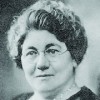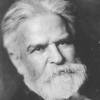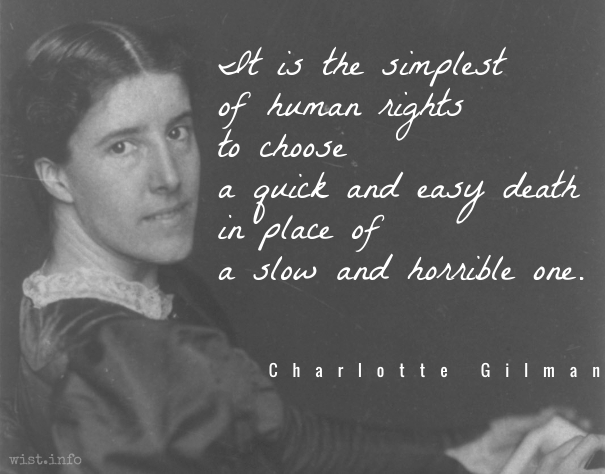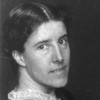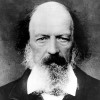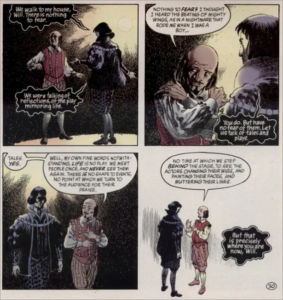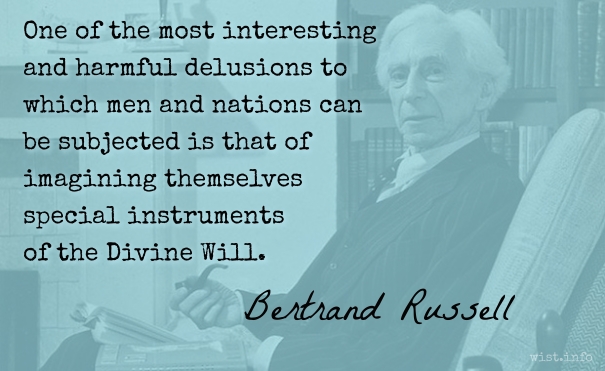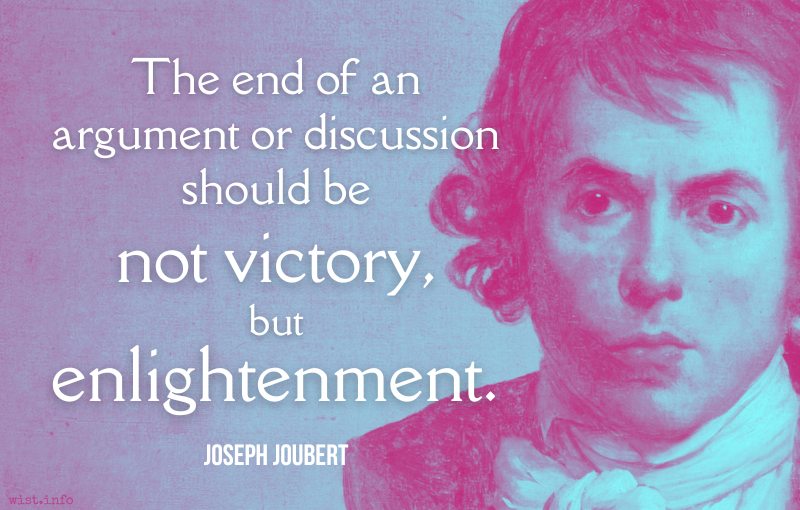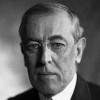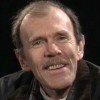A great many people (not you) do now seem to think that the mere state of being worried is in itself meritorious. I don’t think it is. We must, if it so happens, give our lives for others: but even while we’re doing it, I think we’re meant to enjoy Our Lord and, in Him, our friends, our food, our sleep, our jokes, and the birds’ song and the frosty sunrise.
C. S. Lewis (1898-1963) English writer, literary scholar, lay theologian [Clive Staples Lewis]
Letter to Alan Griffiths (20 Dec 1946)
(Source)
Quotations about:
purpose
Note not all quotations have been tagged, so Search may find additional quotes on this topic.
Consider and act with reference to the true ends of existence. This world is but the vestibule of an immortal life. Every action of our lives touches on some chord that will vibrate in eternity.
Edwin Hubbell Chapin (1814-1880) American clergyman
(Attributed)
(Source)
Quoted in Charles Northend, Memory Gems (1890).
Variant: "Every action of your life touches on some chord that will vibrate in eternity." ["Advice to the Young," quoted in Charles W. Sanders, Sanders' Union Fourth Reader (1873)]
The great and glorious masterpiece of man is to know how to live to purpose; all other things, to reign, to lay up treasure, to build, are, at most, but little appendices and props.
[Le glorieux chef-d’oeuvre de l’homme, c’est vivre à propos. Toutes autres choses ; regner, thesauriser, bastir, n’en sont qu’appendicules et adminicules, pour le plus.]
Michel de Montaigne (1533-1592) French essayist
Essays, Book 3, ch. 13 “On Experience [De l’Experience]” (after 1588) (3.13) (1595) [tr. Cotton/Hazlitt (1877)]
(Source)
This passage was added to the original version of the essay, published 1588, for the 1595 edition.
(Source (French)). Alternate translations:
The glorious master-piece of man, is, to live to the purpose. All other things, as to raigne, to governe, to hoarde up treasure, to thrive and to build, are for the most part but appendixes and supportes thereunto.
[tr. Florio (1603)]
The glorious Master-piece of Man is to know how to live to purpose; all other things, to reign, to lay up Treasure, and to build, are at the most but little Appendixes, and little Props.
[tr. Cotton (1686)]
Man's great and glorious master-work is to live befittingly; all other things -- to reign, to lay up treasure, to build -- are at the best mere accessories and aids.
[tr. Ives (1925)]
Our great and glorious masterpiece is to live appropriately. All other things, ruling, hoarding, building, are only little appendages and props, at most.
[tr. Frame (1943)]
Our most great and glorious achievement is to live our life fittingly. Everything else -- reigning, building, laying up treasure -- are at most tiny props and small accessories.
[tr. Screech (1987)]
He achieved success who has lived well, laughed often, and loved much;
Who has enjoyed the trust of pure women, the respect of intelligent men and the love of little children;
Who has filled his niche and accomplished his task;
Who has never lacked appreciation of Earth’s beauty or failed to express it;
Who has left the world better than he found it,
Whether an improved poppy, a perfect poem, or a rescued soul;
Who has always looked for the best in others and given them the best he had;
Whose life was an inspiration;
Whose memory a benediction.Elisabeth-Anne "Bessie" Anderson Stanley (1879–1952) American poet
“Success” (1905)
The essay was written for a poetry contest to answer the question "What is success?" in 100 words or less. It (especially the first 13 words) is often misattributed to Robert Louis Stevenson, Ralph Waldo Emerson, or Elbert Hubbard (the latter probably because the essay appeared in an advertisment in his series of books Little Journeys to the Homes of Great Lovers (e.g.).
More information: Bessie Anderson Stanley - Wikipedia.
Life is a biography, not a series of disconnected moments, more or less pleasurable but increasingly tedious and unsatisfying unless one imposes a purposive pattern upon them.
I am an agnostic partly because I don’t think it is part of the human condition ever to have very much certainty about anything but moments of pleasure and of imminent and immanent death. I don’t think we have a language, will ever have a language, that can describe transcendence in any useful way and am aware that transcendence may be nothing more than the illusory aspiration of a decaying piece of meat on a random rock. The thing is to be humble enough to be content with that while acting to other people as generously as if better things were true, and making art as if it might survive and do good in the world. Because what else are we going to do with the few short years of our life?
Roz Kaveney (b. 1949) British writer, critic, poet
“On Good Friday, I may not have faith, but that doesn’t make me an atheist,” The Guardian (29 Mar 2013)
(Source)
Those people you saw — the realborn — are born without a plan. They’re born because biology tells humans to make more humans; but it doesn’t consider what to do with them after that. Realborn go for years without the slightest clue what they’re going to do with themselves. From what I understand, some of them never actually figure it out. They just walk through life in a daze and then fall into their graves at the end of it. Sad. And inefficient.
What is the meaning of life? That was all — a simple question; one that tended to close in on one with years. The great revelation had never come. The great revelation perhaps never did come. Instead there were little daily miracles, illuminations, matches struck unexpectedly in the dark; here was one. This, that, and the other….
Writing is the only thing that passes the three tests of metier. first, when I’m doing it, I don’t feel that I should be doing something else; second, it produces a sense of accomplishment and, once in a while, pride; and third, it’s frightening.
What do you think God gave you more wealth than is requisite to satisfy your rational wants for, when you look around and see how many are in absolute need of that which you do not need? Can you not take the hint?
There is no greater satisfaction for a just and well-meaning person than the knowledge that he has devoted his best energies to the service of a good cause.
Albert Einstein (1879-1955) German-American physicist
“A Message to My Adopted Country,” Pageant (Jan 1946)
(Source)
Later reprinted as "The Negro Question."
Science is like sex: sometimes something useful comes out, but that is not the reason we are doing it.
Richard Feynman (1918-1988) American physicist
(Attributed)
Many variations can be found for this quotation (none of them with citation); the word "Science" and "Physics" are often interchanged:As noted here, Frank Oppenheimer (a colleague of Feynman's) was quoted saying, "There's a lot of practical fruits to understanding, but it's like sex. There are practical fruits to sex, but nobody would say that's why you do it, normally." Feynman and Oppenheimer may well have collaborated on the general phrasing, or taken it from one another.
- "Science is like sex, it has its practical purposes, but that's not why we do it."
- "Science is like sex. Sometimes something useful comes out, but that is not why we are doing it."
- Physics is like sex. Sure, it may give some practical results, but that's not why we do it."
Human life consists in mutual service. No grief, pain, misfortune, or “broken heart,” is excuse for cutting off one’s life while any power of service remains. But when all usefulness is over, when one is assured of an unavoidable and imminent death, it is the simplest of human rights to choose a quick and easy death in place of a slow and horrible one.
Come, my friends.
‘Tis not too late to seek a newer world.
Push off, and sitting well in order smite
The sounding furrows; for my purpose holds
To sail beyond the sunset, and the baths
Of all the western stars, until I die.
If the concept of God has any validity or any use, it can only be to make us larger, freer, and more loving. If God cannot do this, then it is time we got rid of Him.
For man proposes but God disposes. The path a person takes does not lie within himself.
[Nam homo proponit, sed Deus disponit, nec est in homine via ejus.]
Thomas à Kempis (c. 1380-1471) German-Dutch priest, author
The Imitation of Christ [De Imitatione Christi], Book 1, ch. 19, v. 2 (1.19.2) (c. 1418-27) [tr. Creasy (1989)]
(Source)
Thomas saying that, regardless of a person's good intentions to act virtuously, they are dependent on God's grace to make that actually happen.
The phrase "Man proposes but God disposes" (or the Latin original of it) was coined by Thomas, which makes it ironic where some later translators put it in quotations or self-referent indeeds.
The text given relates to, is frequently footnoted to, and even is quoted directly from:
- Proverbs 16:9 ("A man's heart deviseth his way: but the Lord directeth his steps." [KJV])
- Jeremiah 10:23 ("O Lord, I know that the way of man is not in himself: it is not in man that walketh to direct his steps." [KJV])
(Source (Latin)). Alternate translations:
For man purposeth, but God disposeth: nay, the way that man shall walk in this world is not in himself but in the grace of God.
[tr. Whitford/Raynal (1530/1871)]
Man proposes, but God disposes. The way that a man shall walk in this world is found not in himself, but in the grace of God.
[tr. Whitford/Gardiner (1530/1955)]
For man doth propose but God doth dispose, neither is the way of man in his owne hands.
[tr. Page (1639), 1.19.9]
A Man's Heart deviseth his Way, but the Lord directeth his Steps, says Solomon: We may contrive and act as seems most adviseable; by which we do so, are from the Lord, so is the Event of our having done it entirely in his disposal.
[tr. Stanhope (1696; 1706 ed.), 1.19.3]
Tho' the heart of man deviseth his way, yet the Lord ordereth the event; and that it is not in man that walketh, to direct his steps.
[tr. Payne (1803)]
For man proposes, but God disposes; neither is the way of man in himself.
[Parker ed. (1841); Bagster ed. (1860); Anon. (1901)]
For man proposes but GOD disposes: nor is it in man to direct his steps.
[tr. Dibdin (1851)]
For man proposeth, but God disposeth; and the way of a man is not in himself.
[tr. Benham (1874)]
For man, indeed, proposes but God disposes, and God's way is not man's.
[tr. Croft/Bolton (1940)]
For man proposes, but God disposes, and a man's road is not within himself.
[tr. Daplyn (1952)]
Man proposes, but God disposes, and man's destiny is not in his own hands.
[tr. Sherley-Price (1952)]
They know that "man proposes, and God disposes"; the course of a man's life is not what he makes it.
[tr. Knox-Oakley (1959)]
For man proposes, God disposes, and it is not for man to choose his lot.
[tr. Knott (1962)]
Man indeed proposes, bit it is God who disposes nor is the course of man in his power as he goes his way.
[tr. Rooney (1979)]
SHAKESPEARE: Well, my own fine words notwithstanding, life is no play. We meet people once, and never see them again. There is no shape to events, no point at which we turn to the audience for their praise. No time at which we step behind the stage, to see the actors changing their wigs, and painting their faces, and muttering their lines.
Neil Gaiman (b. 1960) British author, screenwriter, fabulist
Sandman, Book 10. The Wake, # 75 “The Tempest” (1996-02)
(Source)
Speaking to Morpheus. Final issue of the series.
For it is in the person’s choice that wickedness and the commission of injustice are found.
[ἐν γὰρ τῇ προαιρέσει ἡ μοχθηρία καὶ τὸ ἀδικεῖν]
Aristotle (384-322 BC) Greek philosopher
Rhetoric [Ῥητορική; Ars Rhetorica], Book 1, ch. 13, sec. 10 (1.13.10) / 1374a.11 (350 BC) [tr. Bartlett (2019)]
(Source)
Often given as "The intention makes the crime." (Source (Greek)). Alternate translations:
For the criminality and injustice of the act stands essentially in the deliberate principle on which it is done.
[tr. Buckley (1850)]
For vice and wrong-doing depend on the moral purpose.
[tr. Jebb (1873)]
It is deliberate purpose that constitutes wickedness and criminal guilt.
[tr. Roberts (1924)]
For vice and wrongdoing consist in the moral purpose.
[tr. Freese (1926)]
For the immorality and wrongness of an act depend on intentional choice.
[tr. Waterfield (2018)]
A hen is only an egg’s way of making another egg.
Samuel Butler (1835-1902) English novelist, satirist, scholar
Life and Habit, ch. 8 (1877)
Full text.
I am of the opinion that my life belongs to the whole community and as I live it is my privilege to do for it whatsoever I can. I want to be thoroughly used up when I die, for the harder I work the more I live. I rejoice in life for its own sake. Life is no “brief candle” to me; it is a sort of splendid torch which I’ve got a hold of for the moment and I want to make it burn as brightly as possible before handing it on to future generations.
George Bernard Shaw (1856-1950) British playwright and critic
“Art and Public Money,” speech, Municipal Technical College and School of Art, Brighton (1907-03-06)
(Source)
This is the "official" version that shows up in Archibald Henderson, George Bernard Shaw: His Life and Works, ch. 16 (1911), as the final words. A variant version from the reporter's notes was published in the Sussex Daily News (1907-03-07):
I consider my life belongs to the whole community, and while I last it is my privilege to do what I can for it. I want to be worn out, because the harder I am working, the more I live. I enjoy like for its own sake. It is no "brief candle" for me. It is a sort of glorious torch, which I have got the hold of for the moment, and I want to make it blaze brighter before I hand it on to future generations.
For the "brief candle" reference, see Shakespeare.
This passage is sometimes quoted incorrectly preceded by a passage in the "Epistle Dedicatory to Archibald Henderson" to Man and Superman (1903). This error may have come from Stephen Covey, who identified the chimera as one of his favorite quotations.
The end of an argument or discussion should be, not victory, but enlightenment.
[Le but de la dispute ou de la discussion ne doit pas être la victoire, mais l’amélioration.]
Joseph Joubert (1754-1824) French moralist, philosopher, essayist, poet
Pensées [Thoughts], ch. 8, ¶ 41 (1850 ed.) [tr. Collins (1928), ch. 7]
(Source)
(Source (French)). Alternate translations:
The aim of disputation and discussion should not be victory, but improvement.
[tr. Calvert (1866), ch. 8]
The aim of argument, or of discussion, should not be victory, but progress.
[tr. Lyttelton (1899), ch. 7, ¶ 31]
It doesn’t seem to me that this fantastically marvelous universe, this tremendous range of time and space and different kinds of animals, and all the different planets, and all these atoms with all their motions, and so on, all this complicated thing can merely be a stage so that God can watch human beings struggle for good and evil — which is the view that religion has. The stage is too big for the drama.
Richard Feynman (1918-1988) American physicist
Viewpoint interview by Bill Stout, KNXT (1 May 1959)
Reprinted in Perfectly Reasonable Deviations from the Beaten Track, ed. by Michelle Feynman, Appendix I (2006).
I believe that the essence of government lies with unceasing concern for the welfare and dignity and decency and innate integrity of life for every individual. I don’t like to say this and wish I didn’t have to add these words to make it clear but I will — regardless of color, creed, ancestry, sex or age.
Lyndon B. Johnson (1908-1973) American politician, educator, US President (1963-69)
Speech, Civil Rights symposium, LBJ Library, Austin, Texas (1972-12-12)
(Source)
(Source (Video)). Johnson's last public speech.
Lord, make me an instrument of Your peace!
Where there is hatred let me sow love;
Where there is injury, pardon;
Where there is doubt, faith;
Where there is despair, hope;
Where there is darkness, light;
Where there is sadness, joy.
O divine Master,
Grant that I may not so much seek
To be consoled as to console,
To be understood as to understand,
To be loved, as to love;
For it is in giving that we receive;
It is in pardoning that we are pardoned;
It is in dying to self that we are born to eternal life.Francis of Assisi (1182-1226) Italian Franciscan mystic, reformer, saint [b. Giovanni di Pietro di Bunardone]
“Prayer of St Francis” (Attributed)
The poem (in French) appears to date back no further than 1912, and was first misattributed to St. Francis in 1927. The first English translation (as above) is in 1936. More information on its origin here and here. The original French (La Clochette magazine, #12 (Dec 1912):
Belle prière à faire pendant la Messe
Seigneur, faites de moi un instrument de votre paix.
Là où il y a l'offense, que je mette le pardon.
Là où il y a la discorde, que je mette l'union.
Là où il y a l'erreur, que je mette la vérité.
Là où il y a le doute, que je mette la foi.
Là où il y a le désespoir, que je mette l'espérance.
Là où il y a les ténèbres, que je mette votre lumière.
Là où il y a la tristesse, que je mette la joie.
Ô Maître, que je ne cherche pas tant à être consolé qu'à consoler, à être compris qu'à comprendre, à être aimé qu'à aimer, car c'est en donnant qu'on reçoit, c'est en s'oubliant qu'on trouve, c'est en pardonnant qu'on est pardonné, c'est en mourant qu'on ressuscite à l'éternelle vie.
I cannot believe that the purpose of life is to be “happy.” I think the purpose of life is to be useful, to be responsible, to be honorable, to be compassionate. It is, above all, to matter: to count, to stand for something, to have made some difference that you lived at all.
Leo C. Rosten (1908-1997) Polish-American author and political scientist
“Credo,” Passions and Prejudices (1978)
(Source)
This appears to be the final iteration of a thought that Rosen used on numerous occasions. In "On Finding Truth: Abandon the Strait Jacket of Conformity," Speech, National Book Awards, New York City, as reprinted in The Sunday Star (8 Apr 1962):
The purpose of life is not to be happy -- but to matter, to be productive, to be useful, to have it make some difference that you lived at all.
In a later essay, "Words To Live By: The Real Reason For Being Alive," This Week Magazine (20 Jan 1963):
THE PURPOSE OF LIFE is not to be happy. The purpose of life is to matter, to be productive, to have it make some difference that you lived at all. Happiness, in the ancient, noble sense, means self-fulfillment — and is given to those who use to the fullest whatever talents God or luck or fate bestowed upon them. Happiness, to me, lies in stretching, to the farthest boundaries of which we are capable, the resources of the mind and heart.
In "The Myths by Which We Live," The Rotarian (Sep 1965):
Finally there is the myth which gives me the greatest pain: the myth that the purpose of life is happiness, and that you ought to have fun, and that your children ought to have fun. Where was it written that life is so cheap? Where was it written that life is, or should be, or can ever be free of conflict and effort and deprivation and sacrifice? [...] [T]he purpose of life is not to be happy at all. It is to be useful, to be honorable. It is to be compassionate. It is to matter, to have it make some difference that you lived.
A variation of this quotation is misattributed to Ralph Waldo Emerson. More discussion of this quotation (including a shout-out to WIST for some of this research) here: The Purpose of Life Is Not To Be Happy But To Matter – Quote Investigator.
The purpose of life is not to be happy. It is to be useful, to be honorable, to be compassionate, to have it make some difference that you have lived and lived well.
Ralph Waldo Emerson (1803-1882) American essayist, lecturer, poet
(Misattributed)
Though widely credited to Emerson, this appears to be a misattributed variation of a Leo Rosten quotation. More discussion of the connection here: The Purpose of Life Is Not To Be Happy But To Matter – Quote Investigator.
KEATING: We don’t read and write poetry because it’s cute. We read and write poetry because we are members of the human race. And the human race is filled with passion. And medicine, law, business, engineering, these are noble pursuits and necessary to sustain life. But poetry, beauty, romance, love, these are what we stay alive for.
This is the true joy in life, the being used up for a purpose recognized by yourself as a mighty one; the being thoroughly worn out before you are thrown on the scrap heap; the being a force of Nature instead of a feverish selfish little clod of ailments and grievances complaining that the world will not devote itself to making you happy.
George Bernard Shaw (1856-1950) British playwright and critic
Man and Superman, “Epistle Dedicatory” (1903)
(Source)
Happiness is not a reward — it is a consequence. Suffering is not a punishment — it is a result.
Robert Green Ingersoll (1833-1899) American lawyer, agnostic, orator
“The Christian Religion,” Part 2, The North American Review (Nov 1881)
(Source)
Do you covet honor? You will never get it by serving yourself. Do you covet distinction? You will get it only as you serve mankind. Do not forget, then, as you walk these classic places, why you are here. You are not here merely to prepare to make a living. You are here to enable the world to live more amply, with greater vision, and with a finer spirit of hope and achievement. You are here to enrich the world, and you impoverish yourself if you forget this errand.
Woodrow Wilson (1856-1924) US President (1913-20), educator, political scientist
Speech, Swarthmore College (25 Oct 1913)
(Source)
A ship in harbor is safe, but that is not what ships are built for.
John Augustus Shedd (1859-1928) American writer, educator
Salt from My Attic (1928)
Variants:
More information on this quotation here. Sometimes (mis)attributed to William Greenough Thayer Shedd.- "Ships in harbor are safe, but that is not what ships are built for."
- "A ship in port is safe. But that’s not what ships were built for." (used by Grace Hopper)
- "A ship is always safe at shore, but that is not what it is built for." (frequently misattributed to Albert Einstein)
POLONIUS: Though this be madness, yet there is method in’t.
William Shakespeare (1564-1616) English dramatist and poet
Hamlet, Act 2, sc. 2, l. 223 (2.2.223) (c. 1600)
(Source)
It is neither wealth nor splendor, but tranquility and occupation, which give happiness.
Thomas Jefferson (1743-1826) American political philosopher, polymath, statesman, US President (1801-09)
Letter to Anna Jefferson Marks (12 Jul 1788)
(Source)
The salutation is "My dear Sister," and is a congratulations for her marrying Hastings Marks. Some copies, and filings of the letter, make it out to "Anna Scott Marks," her birth name was Anna Scott Jefferson.
It is nothing to die; it is horrible not to live.
[Ce n’est rien de mourir; c’est affreux de ne pas vivre.]
Here’s a test to find whether your mission on earth is finished: If you’re alive, it isn’t.
Richard Bach (b. 1936) American writer
Illusions: The Adventures of a Reluctant Messiah, ch. 15, epigraph (1977)
(Source)





